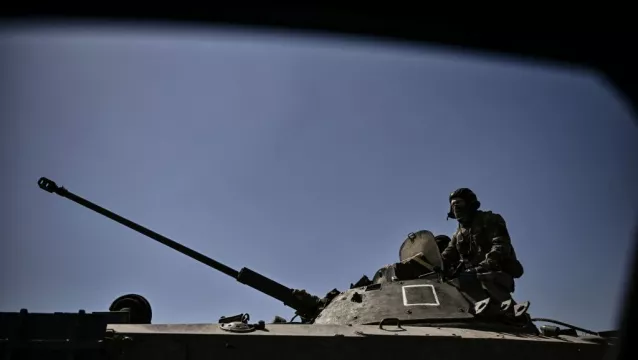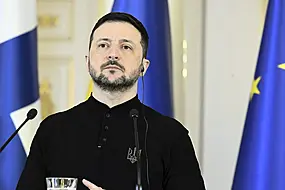Russian forces have blown up a bridge linking the embattled Ukrainian city of Sievierodonetsk to another city across the river, cutting off a possible evacuation route for civilians, local officials said on Sunday.
Sievierodonetsk has become the epicentre of the battle for control over Ukraine's eastern Donbas region. Parts of the city have been pulverized in some of the bloodiest fighting since the Kremlin unleashed its invasion.
"The key tactical goal of the occupiers has not changed: they are pressing in Sievierodonetsk, severe fighting is ongoing there - literally for every meter," Ukrainian President Volodymyr Zelenskiysaid in his nightly video address, adding that Russia's military was trying to deploy reserve forces to the Donbas.
Ukrainian and Russian forces were still fighting street-by-street there on Sunday, the governor of Luhansk province, Serhiy Gaidai, said.
Russian forces have taken most of the city, but Ukrainian troops remain in control of an industrial area and the Azot chemical plant where hundreds of civilians are sheltering.
But the Russians had destroyed a bridge over the Siverskyi Donets River linking Sievierodonetsk with its twin city of Lysychansk, Gaidai said.
That left just one of three bridges still standing.
"If after new shelling the bridge collapses, the city will truly be cut off. There will be no way of leaving Sievierodonetsk in a vehicle," Gaidai said, noting the lack of a cease-fire agreement and no agreed evacuation corridors.
The head of the Sievierodonetsk administration said a little more than a third of the city remained under the control of Ukrainian forces, with about two thirds in Russian hands.
"Our (forces) are holding the defensive line strongly," Oleksandr Stryuk told national TV.
In Lysychansk, Russian shelling killed a six-year-old child, Gaidai said.
After being forced to scale back its initial campaign goals following its invasion of Ukraine, Moscow has turned its attention to expanding control in the Donbas, where pro-Russian separatists have held territory since 2014.
Luhansk region
The fall of Sievierodonetsk, in the last pocket of Ukrainian land held in the strategic Luhansk region, would move Russia a big step closer to one of the stated goals of what Russian President Vladimir Putin calls a "special military operation."
Elsewhere, Russian cruise missiles destroyed a large depot containing U.S. and European weapons in western Ukraine's Ternopil region, Russia's Interfax agency reported.
Ternopil's governor said rockets fired from the Black Sea at the city of Chortkiv had partly destroyed a military facility and injured 22 people. A local official said there were no weapons stored there.
Reuters could not independently confirm the differing accounts.
Moscow has repeatedly criticised the United States and other nations for supplying Ukraine with weapons. Putin said this month that Russia would strike new targets if the West supplied longer-range missiles to Ukraine for use in high-precision mobile rocket systems.
Ukrainian leaders recently have renewed pleas for more heavy weapons. On Sunday, the Ukrainian general staff said in a post on Facebook that General Valeriy Zaluzhny, the head of Ukraine's armed forces had spoken to General Mark Milley, the top U.S. military officer, and reiterated his request for more heavy artillery systems.
Russian forces were firing mortars and artillery south and southwest of Sievierodonetsk, according to Ukraine's general staff. But it said Ukrainian forces had repulsed Russian attempts to advance towards some communities.
Reuters could not independently verify the battlefield reports.
Ukrainian forces have proven more resilient than expected, but the U.S.-based Institute for the Study of War said that as they use the last of their stocks of Soviet-era weapons and munitions, they will require consistent Western support.
Putin says Russia's actions aim to disarm and "denazify" Ukraine. Kyiv and its allies call it an unprovoked war of aggression to capture territory.
Also on Sunday, the leader of the Russian-backed separatist Donetsk region in the Donbas said there was no reason to pardon two British nationals sentenced to death last week after being captured while fighting for Ukraine.
A court in Donetsk on Thursday found Aiden Aslin and Shaun Pinner - and Moroccan Brahim Saadoun - guilty of "mercenary activities" seeking to overthrow the republic.
Britain says Aslin and Pinner were regular soldiers and should be exempt under the Geneva Conventions from prosecution for participation in hostilities. The separatists say they committed grave crimes and have a month to appeal.
Aslin's family said he and Pinner "are not, and never were, mercenaries."







